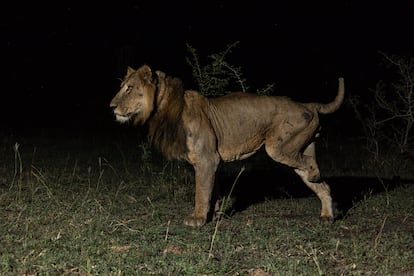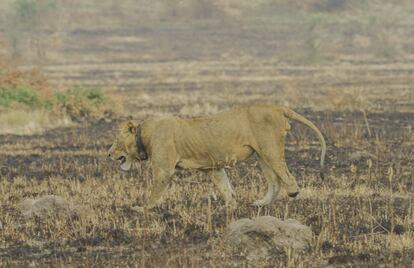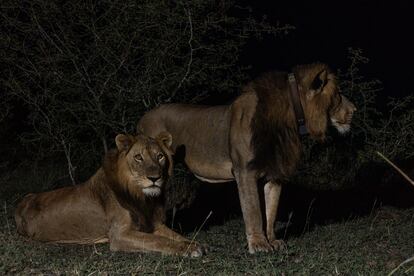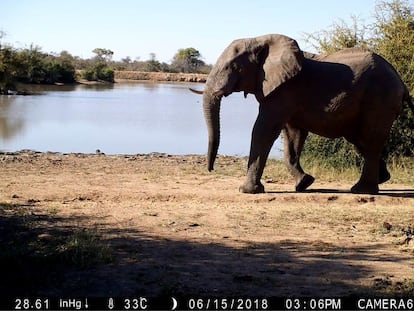Two lions swim across crocodile-infested river in the longest water crossing ever recorded
Competition over females drove Jacob and Tibu to leave their territory in Uganda and search for a new habitat. Scientists filmed the entire journey
Jacob is the most resilient lion in Africa. He survived a buffalo attack, his family was poisoned and sold on the black market for lion parts, and he lost a leg when he fell into a poachers’ trap. “Jacob really is a cat with nine lives,” jokes biologist Alexander Braczkowski, who has followed Jacob closely for years. And as if those feats were not enough, Jacob has once again shown his great resilience by crossing a river full of crocodiles and hippos with his brother Tibu. It is the greatest distance swum by a lion that has ever been recorded. The lions embarked on the dangerous journey due to the shortage of female lions in the Queen Elizabeth National Park in Uganda. This pushed the two brothers to seek a new territory, where they could guarantee their survival and reproductive capacity.
On the dark night of February 1, the two male lions landed in front of the Kazinga Channel, knowing that a risky journey awaited them. This dangerous river, which is up to six meters deep in some points, is home to five-meter predators, more than double their size. The lions’ destination — the shore on the other side — was a mile away. But neither Jacob nor his brother Tibu were afraid. Crossing was the only way to survive.
The biologist’s team was watching it all from the front row, with cameras and drones recording the journey. It took the brothers three attempts to cross the river. On the second attempt, the drone picked up the heat of what could have been a crocodile or a hippopotamus stalking them, which forced the lions to quickly retreat to the shore. A little less than an hour later, the coast seemed clear, and they continued swimming until they crossed the canal. Braczkowski, who works with Griffith University in Australia and Northern Arizona University in the United States, and has studied lions since 2017, describes the feat as “pretty dramatic.” He describes his findings in an article published this Wednesday in the journal Ecology and Evolution.


Of all the skills that lions have, swimming is not exactly one of them. Up until now, the longest water crossing by a lion was between from 10 to 300 meters, and some resulted in deaths from crocodile attacks. In the study, the researchers found signs that other lions have swum distances of nearly one mile between the shore of Lake Kariba and one of its islands, located on the border between Zambia and Zimbabwe, but there is no video evidence of this. “His swim, across a channel filled with high densities of hippos and crocodiles, is a record-breaker and is a truly amazing show of resilience in the face of such risk,” says Braczkowski.
It was local conditions that led the brothers to take the risk: competition for lionesses in the park is fierce. Just a few hours before the crossing, the duo had lost a fight for territory against other males, and remaining in the area could have been dangerous for them. The researchers believe it is likely that this defeat pushed them to undertake the journey: it was an attempt to find the females whose roars they heard on the other side of the channel. Males do not have a very long life expectancy, especially if injured, so reproduction is vital.

For Braczkowski, this behavior is a direct response to the sex imbalance among lions in Queen Elizabeth National Park, and its overall declining population. In just five years, the number of lions has fallen from 71 to 40. Human pressure and hunting have worsened the situation: at least 17 lions, mostly females, were poisoned by nearby residents, presumably to protect their livestock. Males outnumber females by a ratio of two to one.
Since 2018, Jacob and Tibu have formed part of the 11 lions that are tracked by a team from the WCS Uganda and the Lion Recovery Fund. The animals have been fitted with collars with GPS tracking, which has allowed the researchers to monitor their movements in real time and minimize deaths caused by hunting and other conflicts between humans and wildlife.
“Jacob and Tibu’s big swim is another important example that some of our most beloved wildlife species are having to make tough decisions just to find homes and mates in a human-dominated world,” says Braczkowski.
Sign up for our weekly newsletter to get more English-language news coverage from EL PAÍS USA Edition
Tu suscripción se está usando en otro dispositivo
¿Quieres añadir otro usuario a tu suscripción?
Si continúas leyendo en este dispositivo, no se podrá leer en el otro.
FlechaTu suscripción se está usando en otro dispositivo y solo puedes acceder a EL PAÍS desde un dispositivo a la vez.
Si quieres compartir tu cuenta, cambia tu suscripción a la modalidad Premium, así podrás añadir otro usuario. Cada uno accederá con su propia cuenta de email, lo que os permitirá personalizar vuestra experiencia en EL PAÍS.
¿Tienes una suscripción de empresa? Accede aquí para contratar más cuentas.
En el caso de no saber quién está usando tu cuenta, te recomendamos cambiar tu contraseña aquí.
Si decides continuar compartiendo tu cuenta, este mensaje se mostrará en tu dispositivo y en el de la otra persona que está usando tu cuenta de forma indefinida, afectando a tu experiencia de lectura. Puedes consultar aquí los términos y condiciones de la suscripción digital.
More information
Archived In
Últimas noticias
Most viewed
- Sinaloa Cartel war is taking its toll on Los Chapitos
- Oona Chaplin: ‘I told James Cameron that I was living in a treehouse and starting a permaculture project with a friend’
- Reinhard Genzel, Nobel laureate in physics: ‘One-minute videos will never give you the truth’
- Why the price of coffee has skyrocketed: from Brazilian plantations to specialty coffee houses
- Silver prices are going crazy: This is what’s fueling the rally











































